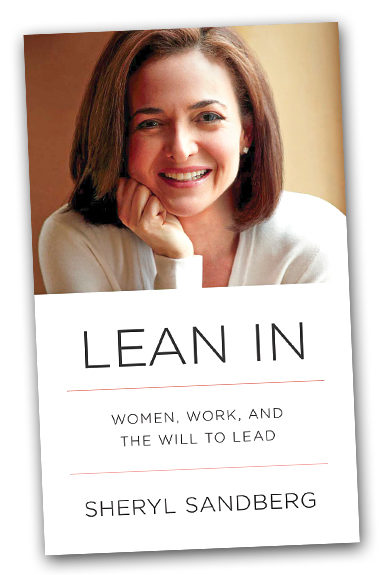Have you heard the phrase “lean in” mentioned in the last few months? Most likely it was in regards to women in leadership. It stems from the book “Lean In: Women, Work and the Will to Lead,” by Sheryl Sandberg.
For several years, Sandberg has given presentations on women in the workforce, including a TEDTalk which has been viewed millions of times.
After receiving feedback from hundreds of women who shared their stories and struggles, she decided to share this message with everyone in an inspiring book.
Sandberg begins by explaining the complex challenges women face. She explores many of the angles that are keeping this world from being led 50/50 by men and women.
She writes, “While women continue to outpace men in educational achievement, we have ceased making real progress at the top of any industry. This means that when it comes to making the decisions that most affect our world, women’s voices are not heard equally.”
She then offers ways that women (and men) can make adjustments to their mindsets or actions that can help women achieve more and feel comfortable in doing so.
The book is a mix of hard data and academic research with Sandberg’s own life experiences and the lessons she learned along the way.
A Harvard graduate, Sandberg has worked at the U.S. Department of Treasury, Google and is currently the chief operating officer at Facebook. She is a wife and a mother of two.
Sandberg comes from a line of women who lean in. She begins by introducing the reader to her grandmother, who was pulled out of high school to help support her family during the Depression.
At the time, education was less important for girls, but luckily a local teacher insisted the family put her back in school. She finished high school and college, managed to save her husband’s business from financial ruin and dedicated herself to raising money for the clinic that helped her beat cancer.
Sandberg ends the book with a look at her mother, who devoted her life to raising her children. When they were grown, she returned to school to study teaching. After 15 years, she left teaching to care for her ailing parents. When they passed away, she started a non-profit.
On the pages in between, Sandberg will help you remember the many people in your life who have inspired you or perhaps have held you back as she introduces you to those who have impacted her.
Her life stories make this book easy to read and very relatable, for we’ve all been in similar situations in one way or another.
As a woman in the workforce myself, I felt I could really identify with much of what Sandberg wrote.
She openly states the book is somewhat of a feminist manifesto. I tend to agree – but not in the radical sense many think of when they hear the term feminist.
She is strong in her viewpoints but not overwhelming. Her tone is straightforward and honest throughout the book.
I also liked how she tackled the challenges faced by working moms, or “career-loving parents,” both at home and at work.
A lack of spousal support is one reason women leave their careers. “Sharing the burden of the mundane can make all the difference,” Sandberg writes.
She encourages men to lean in to their families and help with the laundry, food shopping, cleaning, cooking.
Having a larger role in child care can also go a long way. Children with involved and loving fathers have higher levels of psychological well-being and better cognitive abilities, she cites.
They also have higher levels of educational and economic achievement and lower delinquency rates. These children tend to be more empathetic and socially competent.
The book taught me that women all over the world struggle with leadership for a number of reasons. It’s not always about individual efforts, but there are a lot of social factors that influence it too.
It also made me think of how many talents the world doesn’t get to see. She writes, “The world is being held back because only half the globe’s talent is sitting at the table.”
It’s not just up to women to solve this issue. Men play a significant role as well, and both genders are needed to change societal expectations.
Critics of the book have said it is too focused on the workplace and that not all women judge success with their careers.
I would argue that while the book does center a lot on work, Sandberg doesn’t overlook the many other elements that can make life meaningful.
She notes there is far more to life than climbing a career ladder and that leadership roles are not the only way to have a profound impact in the world.
“Some of the most important contributions to our world are made by caring for one person at a time. We each have to chart our own unique course and define which goals fit our lives, values and dreams,” she writes.
With its central focus on the workforce and the setting of corporate America, I fear that dairywomen might feel this book isn’t for them.
Yet, I believe this book will help women persevere in any profession.
Sandberg shares, “Twenty-one of the Fortune 500 CEOs are women. Women hold about 14 percent of executive officer positions, 17 percent of board seats and constitute 18 percent of our elected congressional officials.”
The numbers for agriculture are not that far off. In fact, according to the USDA’s 2007 Census of Agriculture report, women are the principal operators on 14 percent of U.S. farms.
Men continue to hold a large majority of board seats in cooperatives and organizations that represent the best interests of dairy farms.
What about your dairy? Are women equally represented in the management team and throughout the farm?
There is definitely room for dairywomen to lean in, whether it’s on the farm, in the industry, in community organizations or in government.
I would recommend this book to all women to inspire them to participate more, to set higher goals and to be driven to pursue them.
I think it is also a book for men who employ or work with women because they too stand to benefit from having more women in leadership roles.
Sandberg writes, “I have written this book to encourage women to dream big, forge a path through the obstacles and achieve their full potential. I am hoping that each woman will set her own goals and reach for them with gusto. And I am hoping that each man will do his part to support women in the workplace and in the home, also with gusto.”
The powerful messages in this book have the ability to change society, but it must start with individuals. It is time to lean in. PD

Karen Lee
Editor
Progressive Dairyman






